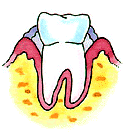
Periodontist - The Periodontal Dentist
A periodontist is a dentist who practices the specialty of periodontics. Periodontists are the dental experts who prevent, diagnose and treat diseases of the periodontium. The words periodontist/periodontium come from the Greek words ‘peri’ (around) and ‘odontas’ (tooth). Periodontium is a term that describes the periodontal tissues that surround, support teeth and keep them in place including the gums, alveolar bone and the periodontal ligaments.
Who is a periodontist? - Dental specialist in periodontics
The most common disease treated by a periodontist is periodontal disease, including conditions such as gingivitis (inflammation of the gums), gum recession and periodontitis (advanced gum disease affecting gum and bone structures).
Periodontists offer a wide range of dental treatments ranging from common non-surgical treatments such as tooth scaling and root planing, to more invasive surgical treatments such as bone and gum grafts.
In recent years, beyond the maintenance of the health and function of periodontal tissues, periodontists also perform many cosmetic dental treatments to improve the esthetics of the mouth. Periodontists along with oral surgeons are the dental specialties usually involved with the surgical placement of dental implants to replace missing teeth.
Training to become a periodontist
Periodontists must complete three years of additional periodontal specialty training in an accredited residency program in periodontics, after graduating from dental school. During their periodontology specialty training, periodontists are trained in:
- Diagnosis of infections of the gum tissues and bone
- Treatments of periodontal disease
- Preventing gum disease by coaching patiens
- Periodontal cosmetic surgery treatments
- Placement of dental implants
- Managing medicine induced and oral pathology issues
Periodontics is a continuously evolving dental specialty, therefore in most countries a periodontist must fulfill specific continuing education requirements to remain familiar with the latest techniques and maintain his certification.
Procedures performed by periodontists
A periodontist performs a variety of periodontal treatments (surgical or non-surgical) in order to either treat periodontal disease, replace missing teeth or improve the appearance of the patient’s smile, including the following:
Non-surgical Periodontal Treatments
In the early stages of gum disease, common treatments include:
- Dental cleaning, to remove bacterial plaque and dental tartar (calculus)
- Scaling and Root-Planing (SRP), a professional deep cleaning to remove plaque and calculus from periodontal pockets, and to smooth the tooth root surfaces.
- Antimicrobial gum therapy, using systemic or topical antibiotics.
- Oral hygiene advice and coaching about brushing and flossing teeth
Periodontal Surgery Procedures
In cases of advanced periodontal disease, periodontists use surgical treatments such as:
- Gingivectomy, in which excess tissue is removed.
- Pocket depth reduction (gingival flap surgery), to reduce the depth of periodontal pockets.
- Soft tissue grafts (gum grafts) and bone grafting, to replace damaged or lost gingival and bone tissue.
- Guided tissue regeneration, to stimulate the body’s ability to regenerate bone and gum tissue.
Dental Implant Placement
A dental implant is an artificial tooth root placed inside the jawbone to support a dental restoration. Periodontists use dental implants to replace missing teeth to restore mouth functionality and esthetics, and prevent jaw bone loss.
Cosmetic Dental Surgery
- Gingivoplasty, to restore the natural shape of treated gums after a gingivectomy
- Gum Recontouring / Crown lengthening, to remove excess gum and bone tissue exposing more tooth surface, in order to even the gum line, or expose a broader smile.
- Root coverage, actually a soft tissue grafting to cover exposed root area in order to improve appearance and reduce sensitivity.
- Ridge augmentation, to correct gum and jawbone indentations.
Laser Gum Surgery
Many periodontists use today laser equipment to perform several of the periodontal surgery procedure. Laser gum surgery can minimize bleeding, swelling and discomfort for the patient during surgery.
When to ask the help of a periodontist?
Usually, your general dentist is the one that will refer you to a periodontist if you need periodontal treatment. Generally you should visit a periodontist whenever you need an expert opinion about periodontal disease, dental implants or cosmetic gum treatments.
Many patients tend to ignore or fail to recognize the symptoms of periodontal disease, increasing the risk of severe periodontal disease and tooth loss. Therefore, periodontists recommend regular periodontal examinations as one of the best measures to prevent periodontal disease from causing irreversible damage to gums and jawbone. You should visit a periodontist for consultation if:
- You have early signs of gum disease such as inflamed, red, tender or swollen gums. Early diagnosed gum disease can be treated easily with simple treatments.
- You have symptoms of advanced periodontal disease such as bleeding gums, pus, gum recession or loose teeth. A periodontist can stop the progress of the disease minimizing the consequences to your oral health and preventing tooth loss.
- You have already suffered gum and bone loss due to periodontal disease and look forward a way to repair the damaged periodontal tissues. Several treatments are available today for a periodontist to restore some of the damage (gum and bone grafts)
- You consider the placement of dental implants to replace missing teeth, lost due to periodontal disease, tooth decay or accident. Periodontists can properly evaluate, design and implement dental implant procedures.
- You are a woman thinking of becoming, or already, pregnant. Pregnancy increases the risk of periodontal disease, which can lead to complications such as premature birth.
- You want to improve the appearance of your smile. A periodontist can use cosmetic dental surgery to treat conditions such as ‘gummy smile’, exposed roots or uneven gum line to enhance your smile.
Regular periodontal evaluation are especially important for those who belong in the high risk groups for developing periodontal disease. The following should visit a periodontist regularly:
- patients with diabetes, heart, respiratory disease or osteoporosis.
- patients with personal or family history of periodontal disease
- smokers
A periodontist is the specialist dentist who can help you keep your teeth for a lifetime, restore confidence in your smile and improve your overall health by treating periodontal disease.

